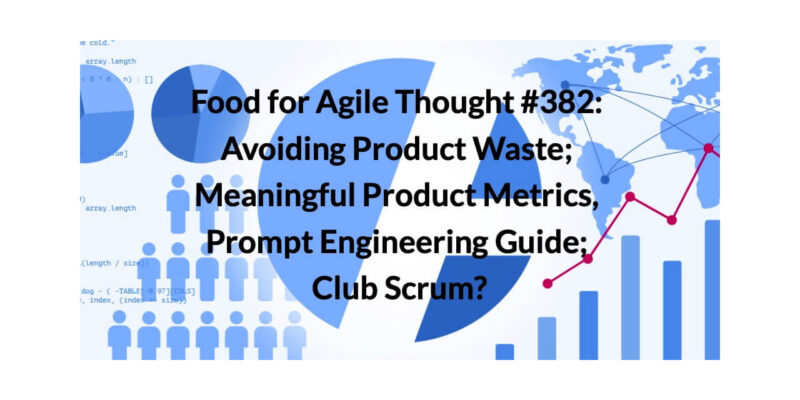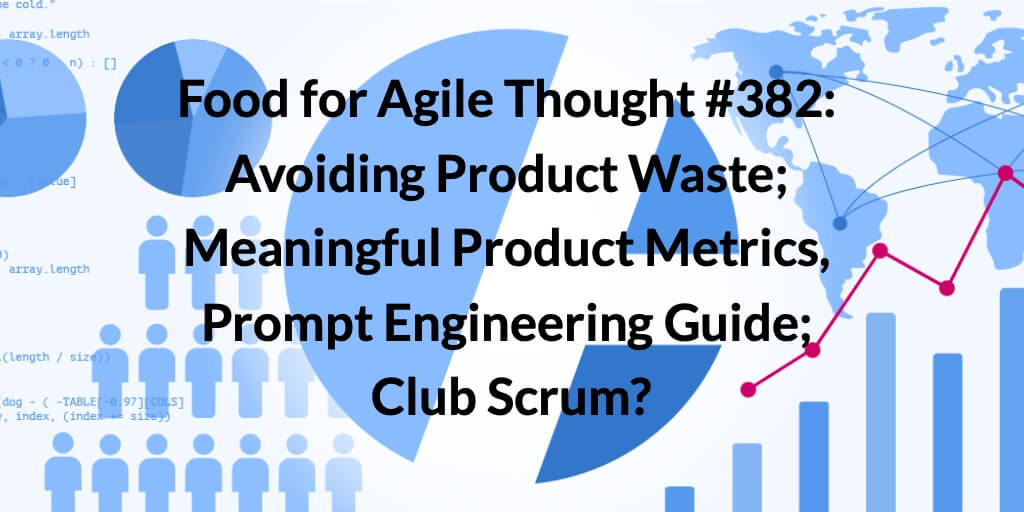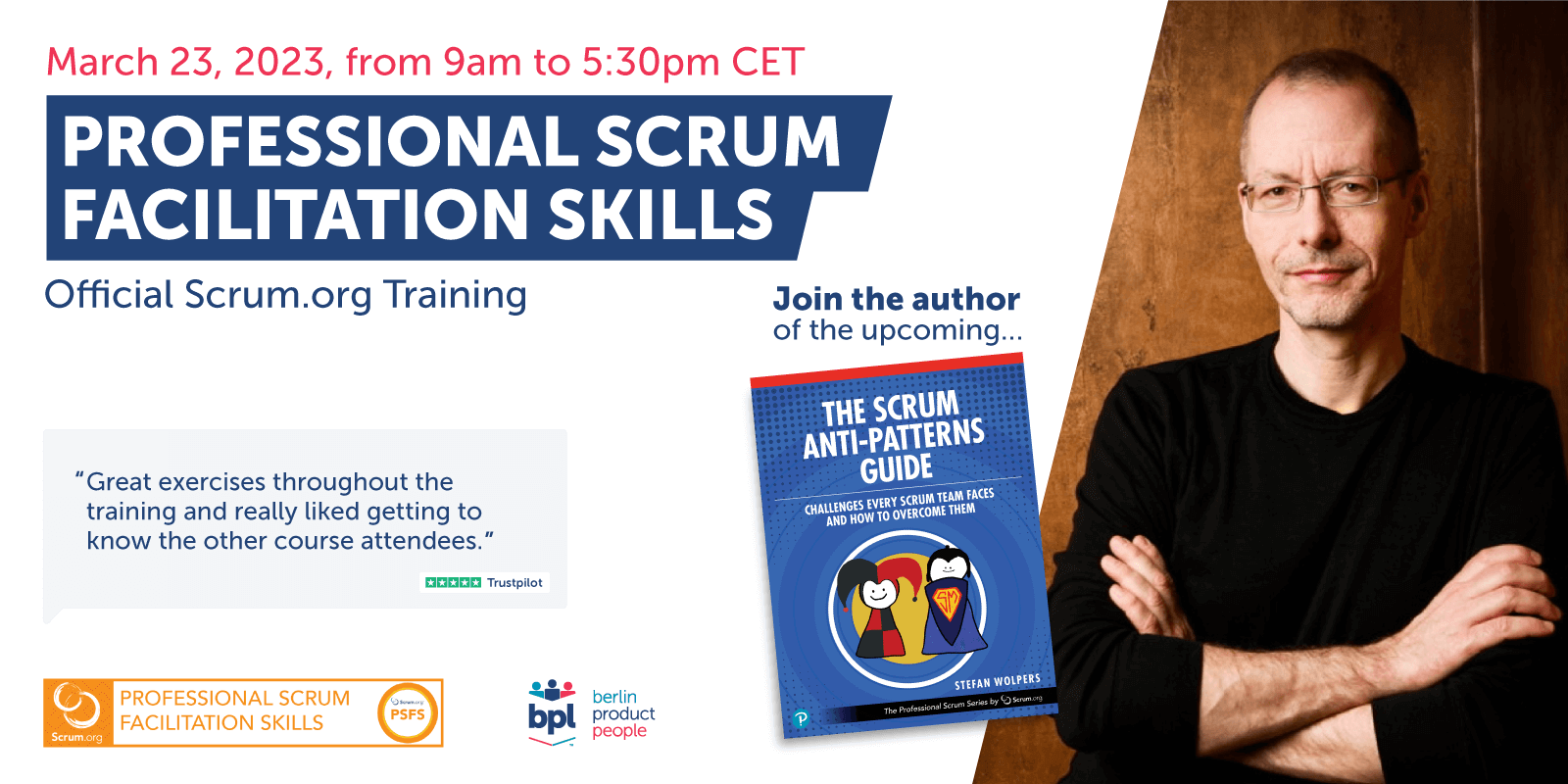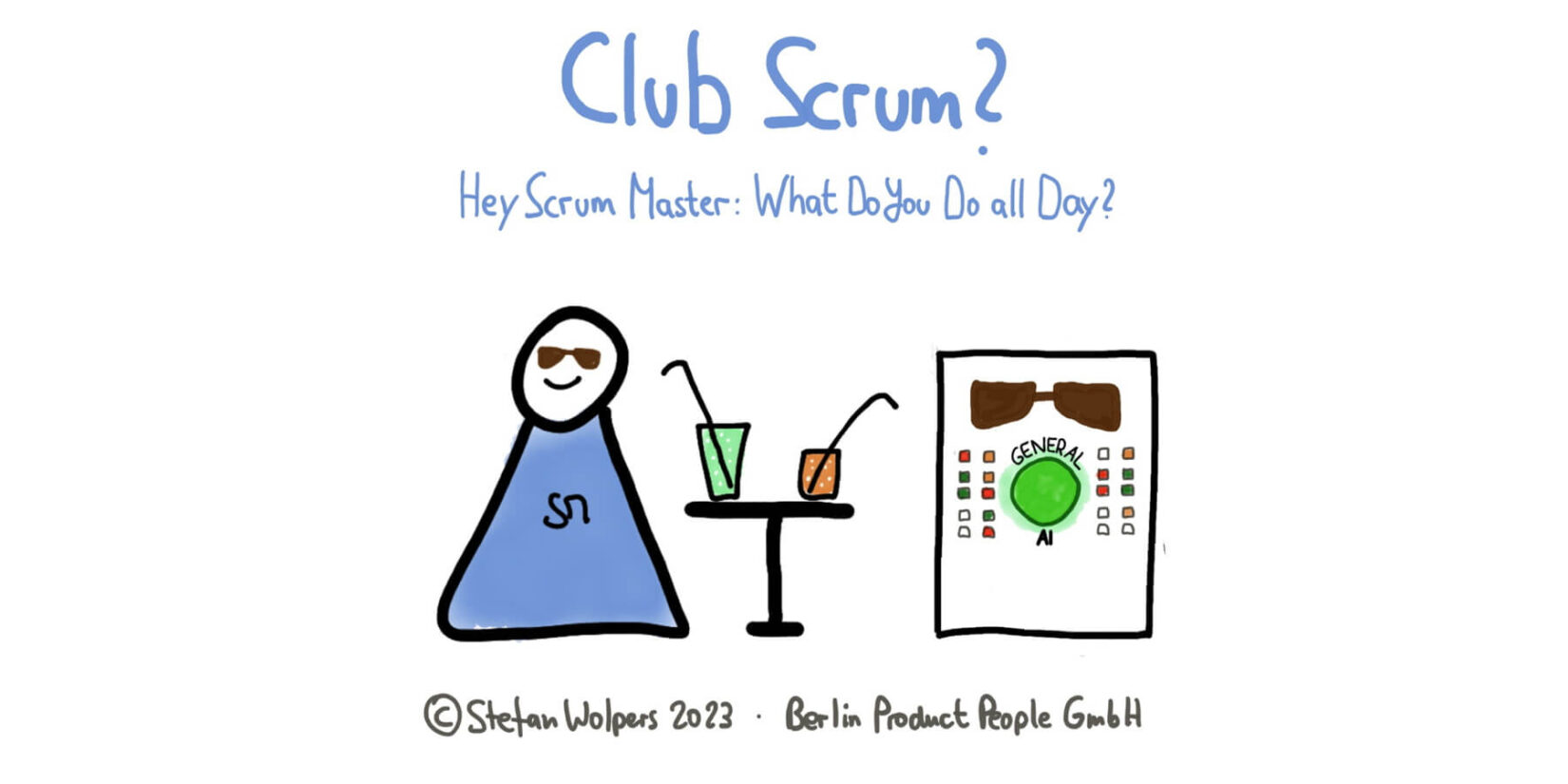TL; DR: Avoiding Product Waste — Food for Agile Thought #382
Welcome to the 382nd edition of the Food for Agile Thought newsletter, shared with 36,960 peers. This week, we explore the best approaches to avoiding product waste. Also, drawing ideas from prolific experts in the field of complexity like Dave Snowden, John Cutler provides an easy ‘entry point into a discussion about complexity [and] complex systems.’ Dealing with complexity eases when an organizational culture guarantees psychological safety. We share four ways of safely creating teams, two based on trust and two based on respect. Lastly, our weekly ChatGPT dose addresses the typical workload of a Scrum Master.
Then, we share insights into metrics of Duolingo’s long game of building a product user love and share voluntarily. Moreover, Teresa Torres dives into the results of the first Continuous Discovery Habits survey and shares outstanding results; for example, shifting from outputs to outcomes. (Pair that one with Cori Widen’s article on the pitfalls of continuous discovery research.) Also, Jiaona Zhang, teaching Stanford’s graduate-level product management course, discusses careers.
Finally, we speculate on why some reject a highly successful practice: the Double Diamond. Is it just a personal agenda? Additionally, we share a primer on best employing ChatGPT for user research, from competitor analysis to defining key metrics to reaching the target audience for insights. Speaking of which: DAIR.AI created a ‘new prompt engineering guide that contains all the latest papers, learning guides, lectures, references, and tools related to prompt engineering.’
Did you miss the previous Food for Agile Thought’s issue 381?
🗞 Shall I notify you about articles like this one? Awesome! You can sign up here for the ‘Food for Agile Thought’ newsletter and join 36,000-plus subscribers.
🎓 Join Stefan in one of his upcoming Professional Scrum training classes!
Join your peers on April 5, 2023: Hands-on Agile #50: The Product Community of Practice w/ Petra Wille.
🏆 The Tip of the Week: Avoiding Product Waste
and : How to Prevent Product Waste
Michael Mace interviews Rich Mironov on the best approaches to avoid building stuff no one wants.
🍋 The Lemon of the Week
We are lemon-free this week!
➿ Agile & Scrum
: Fixing Messy Problems
Drawing ideas from prolific experts in the field of complexity like Dave Snowden, John Cutler provides an easy ‘entry point into a discussion about complexity [and] complex systems.’
: A Critique Of ‘You're Doing Agile Wrong’
‘Scrum is not Agile’ — Andrew Michael Miller believes that the video’s creator is far too idealistic in their approach.
: What Makes A Psychologically Safe Team?
David Burkus shares four ways of building psychologically safe teams, two based on trust and two based on respect.
🎓 🖥 🇬🇧 Professional Scrum Facilitation Skills Class — March 23, 2023
The Professional Scrum Facilitation Skills (PSFS) training by Berlin Product People is a one-day official Scrum.org class for advanced Scrum practitioners and agile coaches, including the industry-acknowledged PSFS certification. This PSFS training class is in English.
Enjoy the benefits of an live-virtual immersive class with like-minded agile peers from 09:00 – 17:30 o’clock CET.
Learn more: 🖥 🇬🇧 Professional Scrum Facilitation Skills Class — March 23, 2023.
👉 From time to time, we can offer last-minute seats for training classes at cost to individuals who do not have access to a corporate training budget. If you like to be notified about these opportunities, please register here.
🎯 Product
(via Duolingo Blog): Meaningful metrics: How data sharpened the focus of product teams
Erin Gustafson shares insights into metrics of Duolingo’s long game of building a product user love and share voluntarily.
: Insights from the CDH Benchmark Survey: How Are Teams Adopting Discovery Habits?
Teresa Torres dives into the results of the first Continuous Discovery Habits survey and shares outstanding results; for example, shifting from outputs to outcomes.
(via First Round Capital): Sweat the Details – Lessons for Mapping Out a Career in Product
Jiaona Zhang ‘shares candid and thoughtful advice earned from every stage of her career journey, from an early career PM to the executive role she holds now.’ (She ought to know, teaching Stanford’s graduate-level product management course.)
📯 Club Scrum: What Are You Doing all Day, ChatGPT — as a Scrum Master?
A few years ago, I ran a survey to figure out what Scrum Masters serving a single Scrum team do all day. Now that we have a new kid, pardon: a new LLM, on the block, I reran the old questionnaire: Club Scrum: What Are You Doing all Day, ChatGPT — as a Scrum Master?
Based on the survey results from 2018, the normalized total amount of time spent on Scrum events, educating themselves, or coaching teammates and stakeholders, respectively, was approximately 12 hours per week, which leaves a lot of room for dealing with impediments.
Read on and learn what ChatGPT considers to be a typical workload. (Excluding the removal of impediments.)
👉 Learn more: Club Scrum: What Are You Doing all Day, ChatGPT — as a Scrum Master?
🛠 Concepts, Tools & Measuring
(via Medium): Why People Keep Attacking the Double Diamond
Malcolm Ryder speculates on why some reject a highly successful practice. Is it just a personal agenda?
(via Dovetail): The pitfalls of continuous discovery research (and how to avoid them)
Cori Widen reflects on continuous discovery’s current popularity, particularly with stakeholders, and points to the fallacy of believing it might be sufficient for all user research needs.
There is a misconception that continuous discovery research doesn’t require actual analysis methodology and that every user touch point offers actionable insights; this can lead to misleading results and poor decision-making.
: Using ChatGPT for User Research
Nick Babich wrote a primer on best employing ChatGPT for user research, from competitor analysis to defining key metrics to reaching the target audience for insights.
🎶 Encore
(via DAIR.AI): Prompt-Engineering-Guide: Guide and resources for prompt engineering
DAIR.AI created a ‘new prompt engineering guide that contains all the latest papers, learning guides, lectures, references, and tools related to prompt engineering.’
📅 Scrum Training & Event Schedule
You can secure your seat for Scrum training classes, workshops, and meetups directly by following the corresponding link in the table below:
See all upcoming classes here.
You can book your seat for the training directly by following the corresponding links to the ticket shop. If the procurement process of your organization requires a different purchasing process, please contact Berlin Product People GmbH directly.
📺 Join 4,000-plus Agile Peers on Youtube
Now available on the Age-of-Product Youtube channel to improve learning, for example, about that Agile is alive:
- 🆕 Hands-on Agile 47: How much Product Discovery Is enough? The Confidence Meter Explained with Itamar Gilad.
- 🆕 Hands-on Agile 46: The Agile Fluency Model ® with Diana Larsen.
- Hands-on Agile 44: Honey, I Shrunk the Backlog with Allan Kelly.
- Hands-on Agile 43: Outcome-Based Product Planning with Jeff Gothelf.
- Hands-on Agile 42: Lean Roadmapping and OKRs with Janna Bastow.
- Hands-on Agile 38: The Product Owner with Roman Pichler.
✋ Do Not Miss Out and Learn more about Avoiding Product Waste — Join the 12,000-plus Strong ‘Hands-on Agile’ Slack Community
I invite you to join the “Hands-on Agile” Slack Community and enjoy the benefits of a fast-growing, vibrant community of agile practitioners from around the world.
If you like to join all you have to do now is provide your credentials via this Google form, and I will sign you up. By the way, it’s free.
Help your team to learn about avoiding product waste by pointing them to the free Scrum Anti-Patterns Guide:









